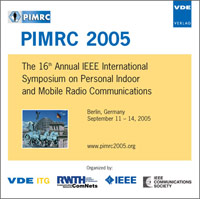DBSMA: A MAC Protocol for Multi-hop Ad-hoc Networks with Directional Antennas
Conference: PIMRC 2005 - 16th Annual IEEE International Symposium on Personal Indoor and Mobile Radio Communications
09/11/2005 - 09/14/2005 at Berlin, Germany
Proceedings: PIMRC 2005
Pages: 7Language: englishTyp: PDF
Personal VDE Members are entitled to a 10% discount on this title
Authors:
Kulkarni, Sunil Suresh (School of Electrical and Computer Engineering, Purdue University, West Lafayette, IN 47907-2035, USA)
Rosenberg, Catherine (Department of Electrical and Computer Engineering, University of Waterloo, ON N2L 3G1, Canada)
Abstract:
Various MAC protocols have been suggested for exploiting the possible benefits provided by directional antennas, but most of the solutions suggested are either based on the concept of sending (MAC level) control packets (such as RTS and CTS) in all directions, or based on the use of some omnidirectional control packet transmissions. We believe that these approaches fail short of exploiting the capability of directional transmission/reception fully and are incapable of handling all the problems resulting from the use of directional antennas in multi-hop wireless networks. Hence we first propose a set of requirements that should be met by a good MAC protocol that uses directional antennas. Then we propose a Directional Busy Signal Multiple Access (DBSMA) protocol that meets these requirements. In DBSMA, all the transmissions, receptions, and idle listening are directional. The need to listen in many directions when in an idle state is achieved by constantly changing the listen direction to cover the whole space. We also propose a novel directional back-off mechanism in which every node maintains independent back-off windows for each direction and show how it yields better performance. We show that DBSMA is well suited for ad-hoc multi-hop networks with directional antennas.


